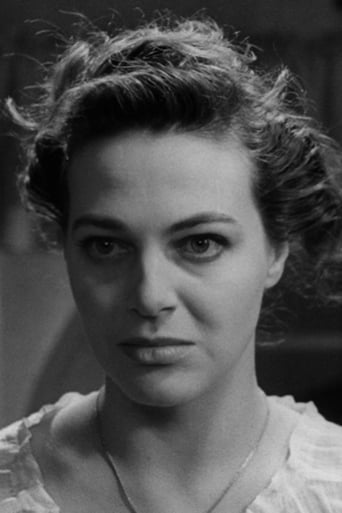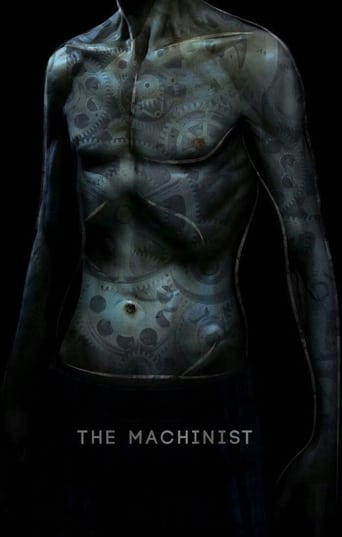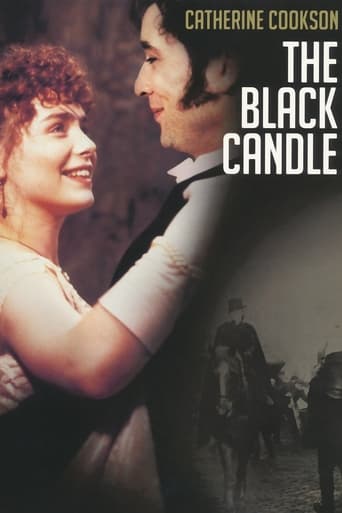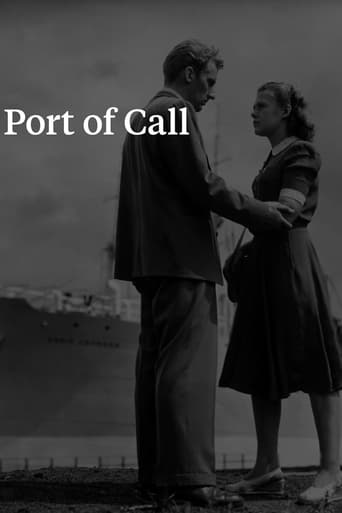
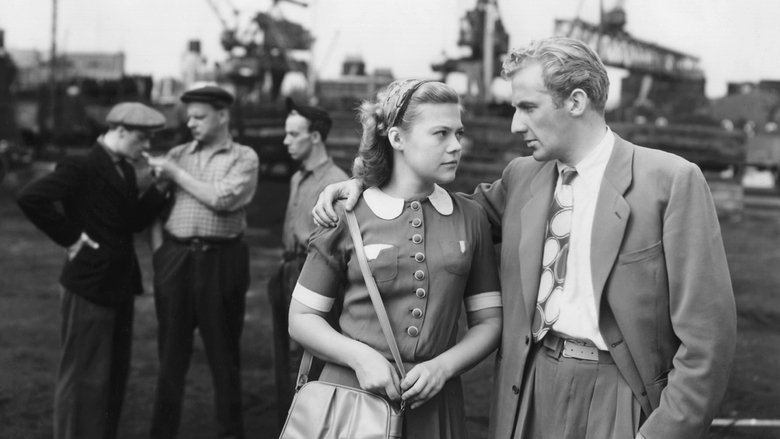
Port of Call (1948)
A suicidal factory girl out of reformatory school, anxious to escape her overbearing mother, falls in love with a sailor who can't forgive her past.
Watch Trailer
Cast


Similar titles
Reviews
everything you have heard about this movie is true.
I cannot think of one single thing that I would change about this film. The acting is incomparable, the directing deft, and the writing poignantly brilliant.
It is neither dumb nor smart enough to be fun, and spends way too much time with its boring human characters.
The film never slows down or bores, plunging from one harrowing sequence to the next.
While it is true that Swedish films were far more permissive in the 1940s, how frank this film is might surprise you--especially as it's quite a bit more so than director Bergman's later films.The film begins with Gösta returning from several years at sea. He's tired of the life and settles into the life of a dockworker. Very soon after, he meets a young lady (Berit) at a dance hall and they sleep together that same night. Berit worries that it's just a one night stand but Gösta does return later. However, Berit also worries that he won't stick around when he learns her past--she's been to reform school and is a mess. When she finally tells him, he doesn't know what to do. To make it worse, soon she brings a dying friend to his apartment--and she's sure there's no way he'll stick around now. Is there any hope for this couple? Aside from premarital sex, the film also deals with family dysfunction and a botched illegal abortion--all in a very non-judgmental manner. I am pretty sure it caused a bit of a stir in its day. I admired it because in just about every way the film tried very hard to deal with reality and avoid clichés. And, to avoid clichés, the film ends with many, many questions unanswered--just like in real life. It was all handled so well that I can't help but admire the film and feel it's actually a lot better than much of Ingmar Bergman's later more celebrated work, as it's simpler and less focused on depression (like many of his 1960s-70s films). Well worth seeing.
This is really a film about an unhappy woman,the people around her and her journey to find happiness. The other characters are props but props devised with imagination and played quite well. She has been sent to reformatory time and again and her attempts to find sexual love frustrated at every attempt. We feel for her and sense that she is a good human being who has simply not seen a break. In flashback we see the reason for her unhappiness - an abusive, unsympathetic mother, people willing to exploit her...There is little of anything we have come to associate with the older Bergman. The camera movements are in Hollywood-style and the editing invisible. The girl's desolation is mainly private, even from the viewer, but the film is one about her and not the other characters. This is one of Bergman's central points throughout his career. I'm glad I saw this but now it's time to move on.Curtis Stotlar
Port of Call (1948)** 1/2 (out of 4)Early Bergman film has a young woman, Berit (Nine-Christine Jonsson) throwing herself into the ocean in a suicide attempt but being pulled out by a man named Gosta (Bengt Eklund). Sometime after the two meet up at a party when they go back to her house for sex, which soon leads up to a relationship. The relationship starts off on a bad note as Berit is haunted by her past as well as secrets she doesn't want revealed. This is a very dark and bleak love story from Bergman that hits on a few familiar themes of his later films but for the most part you really can't look at this and say this is one of his better movies. There are certainly some very good touches here and there and the performances are great but I think the movie would have benefited from some editing and a better pacing. A lot of the middle parts of the film seemed to have just been repeating itself and I didn't care for the flashback scenes at all. When Berit starts telling her backstory to Gosta, I think strong dialogue would have been a lot better than actually watching the stuff play out. Another thing I didn't care too much for was the ending, which really seemed to be taped on from another film. It didn't really match up with anything that came before it and it played out too simply. For a film from 1948 this really hits on some touchy subjects including all the sex, an aborition and there's even some brief nudity. I'm sure this movie would have been very shocking when originally released but today it comes off rather tame and even the drama isn't as tight as one would expect from the director. With that said, there's still a lot to enjoy here and that includes the terrific performances with Jonsson stealing the show as the troubled youth. She's very believable in her role and her opening shot, the look of her eyes, is quite priceless and tells us all we need to know before she even says anything or we're told anything. Eklund is also very strong in his role as is Mimi Nelson as the mother. Bergman handles the material quite well even though, as I said, the pacing could have been a little better.
"Hamnstad" is one of the rare Swedish films focusing on family life.Its uniqueness is due to the fact that it has an eclectic mix of serious themes. These themes include bitter, harsh realities like abortion,broken home, correctional house etc. Bergman has deftly portrayed the dreary lives of its two lonely protagonists : Gosta and Berit. For this purpose, he has chosen a small provincial port town where nothing much happens. This film is a good record of how gloomy the life in Sweden (Europe) during 1940s was. Bergman has also shown us how all emotional problems are solved if lovers decide to remain true to each other. This is precisely the case of Gosta and Berit.Gosta has always led a hard life. He is a moody soul too. As a sailor, he has been out on sea for many years. For this reason he is unable to believe that some girl can enter his life in order to love him.There are doubts in Berit's mind too. As a loner, she tries hard to leave her past behind. As a young lass, Berit witnessed numerous fights involving her father and mother. This is one of the reasons why there is enormous distance between Berit and her mother. It is during one of these turbulent emotional phases that Berit meets Gosta. Even though Gosta is a tough nut to crack, his love for Berit is real. On one occasion, Gosta fights some young rascals to prove his intensity of emotional attachment for Berit. Gosta even proves that he is the ideal man for Berit as he solemnly ignores Berit's revelation that in the past, she was sent to a correction house. He urges Berit to make an earnest effort to leave her past behind. Berit has no hesitation at all in following this humble piece of advice. It is precisely in this manner that both Berit and Gosta embark on a successful journey to lead a happy, joyful life as companions for life. All of Bergman's film have a message to offer to audiences. Through "Hamnstad", he wishes to tell us all that being alone is a terrible feeling.




